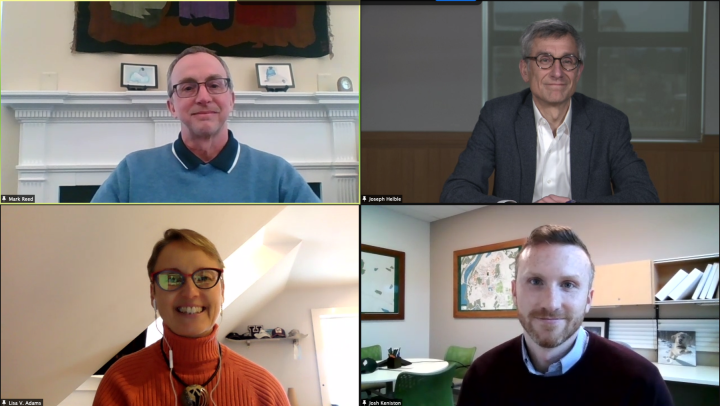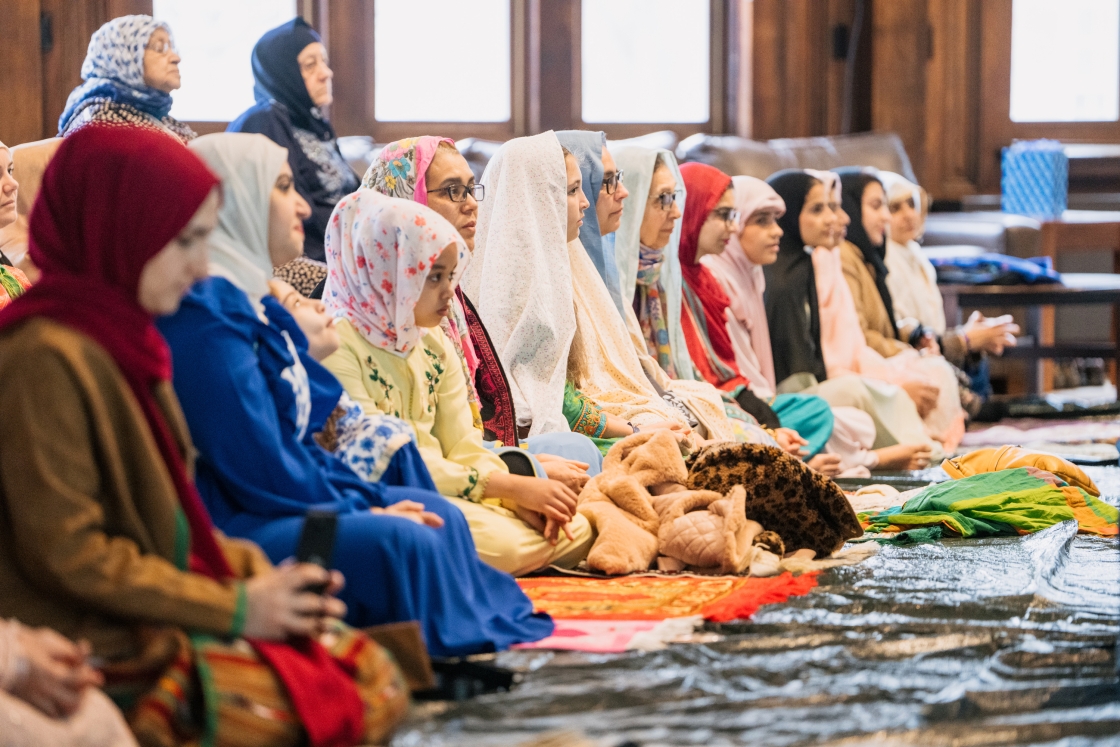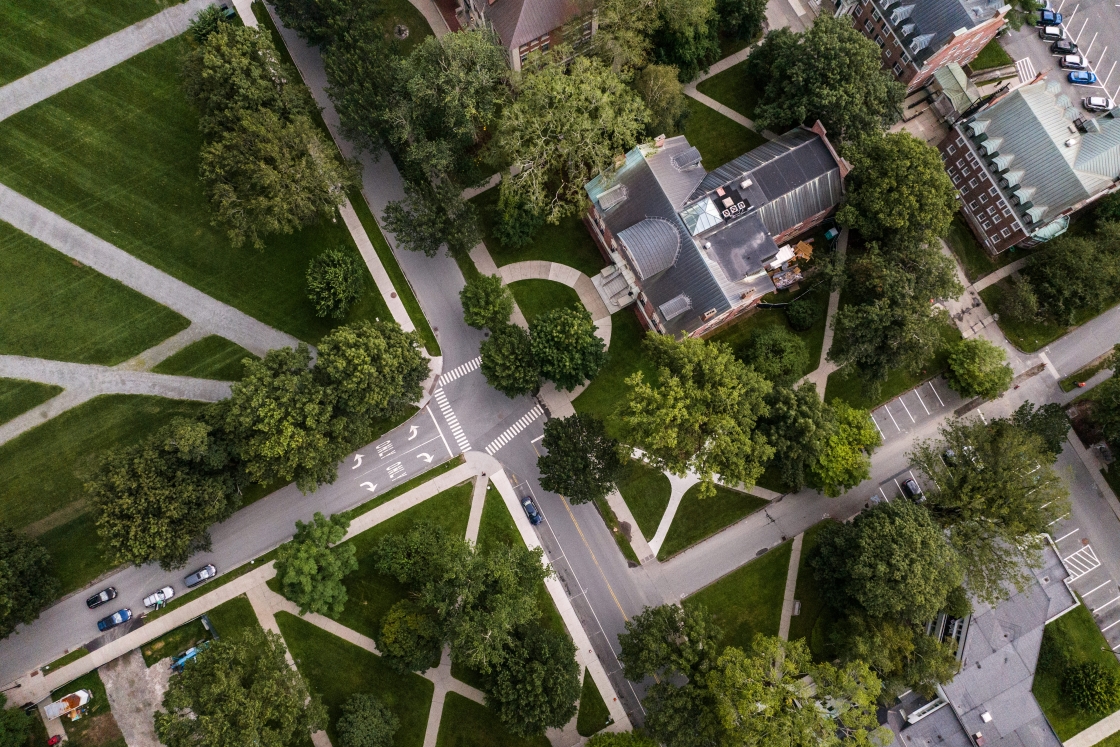The COVID-19 outbreak first identified on campus last week appears to be slowing, but it is too soon for the community to let its guard down, Provost Joseph Helble told viewers of this week’s Community Conversations webcast.
In the past seven days, 139 students and three employees have tested positive for the coronavirus and remain in isolation, and another 139 students are currently in quarantine, and 142 are in isolation, according to Dartmouth’s COVID-19 dashboard. Libraries and athletic facilities are closed, and dining has shifted to a “grab-and-go” mode for students not in quarantine or isolation—precautions that will be in place at least through Friday.
While “it remains too early to lift any of these restrictions,” the trend is going in the right direction, Helble said—from 40 new cases on Saturday down to 19 on Sunday, with an average of 10 new cases a day for the past three days. The decision to loosen or extend the restrictions will be announced on Friday.
(Those in quarantine have not tested positive for the virus and do not have symptoms but have been identified as being at risk for COVID-19 exposure. Those in isolation may or may not have symptoms and have tested positive for the virus or are awaiting test results. Four employees are in quarantine and nine are isolating.)
Helble was joined on the webcast this week by Dartmouth College Health Service Director Mark Reed and COVID-19 Task Force co-chairs Lisa Adams and Josh Keniston, in a conversation moderated by Vice President for Communications Justin Anderson.
Variants and Vaccines
Adams, the associate dean for global health and an epidemiologist and associate professor of medicine at the Geisel School of Medicine, said that while Dartmouth has not been specifically testing for new strains of the COVID-19 coronavirus, she believes the campus’ current outbreak is “highly likely” to be the mutation first identified in the United Kingdom, known as the B.1.1.7 variant, which is more transmissible than the original SARS-CoV-2 virus and has been found to be present in New Hampshire.
“The somewhat explosive nature of this outbreak suggests that this is a virus with a higher transmission rate,” Adams said. She also noted that federal health officials had predicted that the B.1.1.7 variant “will be the predominant strain circulating in the U.S. by March—and here we are on March 3.”
Dartmouth does not plan to test for the variant on an individual basis, but will work with Dartmouth-Hitchcock Medical Center (DHMC) to do the genetic sequencing “on a subset of our samples” to understand whether the variant is on campus, Adams said.
The current outbreak “serves as a painful reminder of why we need to double down on our masking, our distancing, our avoiding gathering together as much as all we want to do,” Adams said. “This is a time, as Dr. Tony Fauci said, to keep our foot on the accelerator.”
Asked about plans for vaccinating the community, Adams said Dartmouth is talking with New Hampshire state officials and with DHMC about becoming a point of distribution, or POD. “But we will be following the New Hampshire allocation scheme” in terms of who is eligible to receive the vaccine when, she said. “That does not allow our community members to jump the queue.”
Student Health, Near and Far
Reed said that most of the students currently in isolation are experiencing mild to moderate symptoms, and none so far have needed hospitalization.
But mild symptoms do not mean that COVID-19 is not a potentially serious illness, even for a young and healthy population. Reed said that he and the staff at Dick’s House have started to see students “presenting with long-haul symptoms like fatigue, brain fog, persistent loss of smell and taste, and even some autonomic symptoms where if they try to exercise their heart rate builds up. These are students who had mild symptoms when they had COVID.”
The literature suggests that such long-haul symptoms could affect up to 10% of COVID-19 patients, he said.
Reed’s staff stays in daily phone contact with students in isolation and quarantine, conducts contact tracing, and is available to provide medical and mental health services for all students, including those who are studying remotely this term.
“We’ve had to be creative and innovative in workshops, podcasts, groups, doing consultations, and really, for any students that have urgent needs, working with them until the crisis is over and getting them connected either locally or at a distance,” he said.
To meet an increased demand for mental health services, Reed, who is a psychiatrist, said Dartmouth Health Services is increasing its counseling staff by 50%, from 10 to 15 staff counselors.
Late Night Dining
In response to student requests, dining services will start providing food after hours, from 9 p.m. until midnight, beginning on Friday and running through Tuesday, March 16, “to help sustain students in their late-night evening studies in their rooms,” Helble said.
Keniston, the vice president of Campus Services and Institutional Projects, spoke about the logistics of switching from in-person to “grab-and-go” dining and delivering meals to the students in quarantine and isolation.
“It is not a small task to make deliveries several times a day, with people coming in and out of quarantine and isolation,” he said. “Our teams have been flexible and have stepped up to help support everyone and to help ease the quarantine and isolation process.”
Looking Ahead to Spring and Beyond
Keniston said the current schedule for spring term move-in dates won’t change unless the number of positive cases take a turn for the worse. “I would say I’m optimistic that we are headed on the right path and we will be good to go for spring arrival as planned,” he said.
Helble said he expects spring operations to look similar to the past fall and winter, with the summer as “a term of transition,” as more members of the community will have had access to vaccinations.
“I’m quite hopeful that we have two more terms of this (spring and summer) and fall will feel closer to a regular Dartmouth term with much more of the curriculum being offered in person,” Helble said. “Of course, that is not a promise. It depends on so many things, including vaccination and disease progression.”
As in the winter, students on campus during the spring term will have a variety of opportunities to engage outdoors, including, among others:
- Tents for outdoor socially distanced gatherings and some class sessions
- A nine-hole disc golf course
- Electric bikes available for use
- Boat rentals at Ledyard Canoe Club
- Guided hiking and outdoor exploration of the area
- Equipment for a variety of lawn games
- Continued access to fire pits and Adirondack chairs on the Green
Helble said Dartmouth continues to plan for an in-person commencement ceremony for graduating students in June. But he stressed that such a gathering—which would not include guests—would be possible only if the campus could return to and sustain a low COVID-19 positivity rate, and would be canceled if testing revealed another late-term outbreak.
“Commencement is being planned, but it is not a guarantee—it is in our hands as a community to make this happen,” he said. “It is going to take all of us—each and every one of us looking out for one another and taking the steps we need the take to protect the health of the community and the campus.”
Community Conversations is a live production of Dartmouth’s Media Production Group and the Office of Communications that airs on selected Wednesdays at 3:30 p.m. The next show airs March 17.
For the most recent information on Dartmouth’s response to the pandemic, visit the Dartmouth Together COVID-19 website.
Hannah Silverstein can be reached at hannah.silverstein@dartmouth.edu


